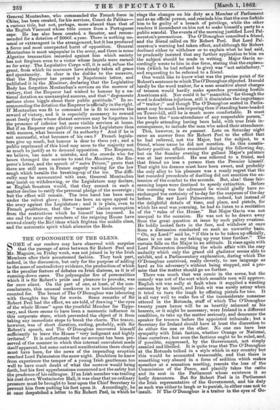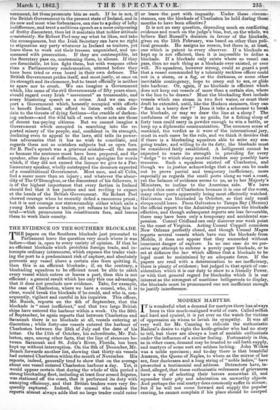THE O'DONOGH1JE OF THE GLENS.
SOME of our readers may have observed with surprise that the passage of arms between Sir Robert Peel and Mr. Maguire, on Friday week, was not joined in by the Irish Members after their accustomed fashion. They took part, indeed, in the discussion, but only for the purpose of adding to the mass of contradictory evidence, the production of which is the peculiar feature of debates on Irish distress, as it is of running-down cases. The polyangular fire of personalities which it is Sir Robert's pride and pleasure to provoke, was for once silent. On the part of one, at least, of the non- combatants, this unusual meekness is now handsomely ac- counted for. The breast of The O'Donoghue was labouring with thoughts too big for words. Some remarks of Sir Robert Peel had the effect, we are told, of drawing "the eyes of the whole House" upon the youthful Member for Tippe- rary, and there seems to have been a mesmeric influence in this corporate stare, which prevented the object of it from taking any immediate steps to break the charm. The trance, however, was of short duration, ending, probably, with Sir Robert's speech, and The O'Donoghue recovered himself sufficiently to leave the House "very indignant and highly irritated." It is unfortunate that no account has been pre- served of the manner in which this internal convulsioà made itself apparent, but some outward manifestations there clearly must have been, for the news of the impending eruption reached Lord Palmerston the same night. Doubtless he knew from experience the temper of a young Irish gentleman too well to have much doubt of what the morrow would bring forth, but his first apprehensions concerned not the safety but the prudence of his colleague. If an Irish member was trailing his coat down Westminster Hall, it was clear that no ordinary pressure must be brought to bear upon the Chief Secretary to prevent him from putting his foot upon it. Accordingly, he at once despatched a letter to Sir Robert Peel, in which he rings the changes on his duty as a Member of Parliament and as an official person, and reminds him that the one forbids him to be guilty of a breach of privilege, while the other renders it incumbent on him not to make himself a party to a public scandal. The events of the morning justified Lord Pal- merston'a precautions. The O'Donoghue consulted a friend, and the friend called on Sir Robert Peel. But Lord Pal- merston's warning had taken effect, and although Sir Robert declined either to withdraw or to explain what he had said, he prudently insisted that any further application to him on the subject should be made in writing. Major Gavin ac- cordingly wrote to him in due form, stating that the explana- tion (which he had refused to give) was "not satisfactory," and requesting to be referred to a friend. One would like to know what was the precise point of Sir Robert's sentence to which The O'Donoghue objected. It could hardly be the word traitor, for a man sensitive about charges of treason would hardly make speeches promising hostile Americans aid. Nor could it be" mannikin," for though the word is doubtless injurious, still it diminishes the importance of" traitor ." and though The O'Donoghue seated in Parlia- ment may be much less imposing than if standing bare-headed on Tower-hill, still he is much more comfortable. It must have been the "non-attendance of any respectable person," the people attending having been held, with true Irish in- consequence, to include the man who asked their attendance.
This, however, is en 1)assant. Late on Saturday night came an answer from Sir Robert Peel to the effect that he had referred, not the Major, but the subject, to a friend, whose name be did not mention. In this unsatis- factory position affairs remained during the following day, but on the Sunday evening the gallant Major's patience was at last rewarded. He was referred to a friend, and that friend no less a person than the Premier himself. That night his dreams must have been sweet, and probably the only alloy to his pleasure was a manly regret that the last recorded precedents of duelling did not sanction the ex- tension of the combat to the seconds. But, alas these fair- seeming hopes were destined to speedy extinction. Before the morning was far advanced he would gladly have re- exchanged the certainty of to-day for the suspense of the day before. He saw Lord Palmerston, indeed, but instead of the delightful details of time, and place, and pistols, for which his soul was seaming, he had to listen to a recitation of the "rules of the House." But Major Gavin was not unequal to the occasion. He was not to be drawn away from the great question at issue by such paltry evasions. He boldly looked facts in the face, and withdrew at once from a discussion conducted on such an unworthy basis. "Oh, my Lord !" said he, "if this is to be taken up officially, there is no use in my taking up your time further." The curtain falls on the Major in an attitude. It rises again with Lord Palmerston describing the whole affair with the easy audacity which only the grand old gladiator seems able to exhibit, and a Parliamentary explanation, during which The O'Donoghue contrived, really cleverly, to use language as hard as his adversary's without being stopped, and a pro- mise that the matter should go no further. There was much that was comic in the scene, but the comedy was not of the sort which sensible men will approve. English wit was sadly at fault when it supplied a wanting sarcasm by an insult, and Irish wit was surely astray when it tried to turn the laugh by offering pistols for two. It is all very well to make fun of the inconsiderate nonsense uttered in the Rotunda, stuff of which The O'Donoghue twenty years hence will be as heartily ashamed as his hearers, or it might be necessary, were Ireland in a different condition to take up the matter seriously, and denounce the speaker for treason before the appointed tribunals; but a Secretary for Ireland should have at least the discretion to do either the one or the other. No one can have less sympathy with Irish faction, whether Orange or National, than ourselves ; but even the factions ought to be ruled, and, if possible, suppressed, by the Government, not simply assailed and libelled. It is quite true that The O'Donoghue at the Rotunda talked in a style which in any country but this would be accounted treasonable, and that there is something very absurd in a form of sedition which makes speeches at a sensation meeting, resents the loss of the Commission of the Peace, and placidly takes the oaths and its seat in the Parliament whose existence it so hotly denounces. But Sir Robert Peel is in Parliament the Irish representative of the Government, and his duty as such was either to laugh or to punish, in either case not to insult. If The O'Donoghue is a traitor in the eyes of GO- vernment, let them prosecute him as such. If he is not, if the British Government in the present state of Ireland, and in its new and most wise forbearance, can rise to a policy of lofty indifference, and treat a seditious speech as a mere outpouring of frothy discontent, then let it maintain that nobler attitude consistently. Sir Robert Peel may say what he likes, and take the consequences, but the Irish Secretary can have no right to stigmatize any party whatever in Ireland as traitors, yet leave them to work out their treason unpunished, and un- menaced with prosecution. If they are contemptible, let the Secretary pass on, contemning them, in silence. If they are formidable, let him fight them, but with weapons other than a Parliamentary condemnation, uttered before they have been tried or even heard in their own defence. The British Government prides itself; and most justly, at once on its strength and its clemency, but to taunt officially is neither to spare nor to crush. We can imagine a Government which, like some of the evil Governments of fifty years since, should regard every Irish "movement" as treasonable, and every blustering speech as a crime. And, we can sup- port a Government which, honestly occupied with efforts to benefit Ireland, can afford to listen with calm dis- dain to the threats of dying factions—the crackle of darken- ing embers—and the wild talk of men whose acts are those of decent tax-paying citizens. But we cannot imagine a Government which occupied in searching into the re- ported misery of the people, and, confident in its strength, declining even to appeal to the laws, still tells its power- less adversaries that it has no wish to conciliate, and regards them not as mistaken subjects but as open foes. Sir R. Peel's speech was a grievous mistake—all the more so because the sentence must have been prepared, and the speaker, after days of reflection, did not apologize for words which, if they did not exceed the licence we give to a Par- liamentary speaker, wholly outstepped the decorum expected of a constitutional Government. Most men, and all Celts, feel a sneer more than an injury ; and whatever the absur- dity of The O'Donoghue, or the discontent of his followers, it is of the highest importance that every faction in Ireland should feel that it has justice and not reviling to expect at the hands of the British Government. Sir Robert Peel showed courage when he recently defied a rancorous priest ; but it is not courage nor statesmanship either which calls a young Irish member a traitor, yet refuses to bring him to trial—which pronounces his constituents foes, and leaves them to work their enmity.































 Previous page
Previous page